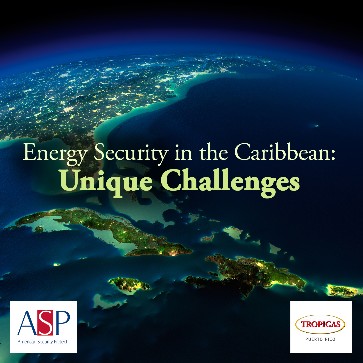| Date | February 4, 2015 |
| Time | 12:00pm – 5:00pm |
| Location | ASP Conference Facilities, 7th Floor West Tower, 1100 New York Ave NW, Washington DC |
Energy insecurity and availability are challenges that countries around the world face, but few places in the world face it like the islands of the Caribbean do. The islands are a diverse mix, ranging from Communist Cuba to the American territory of Puerto Rico, from small, isolated islands like Anguilla to large, multi ethnic islands like Hispaniola.
Most of the islands in the Caribbean have few indigenous fossil fuel resources, so virtually all of their energy needs are met by imported fossil fuels. To compound this, because of the lack of scale, costs for infrastructure are often much higher than for mainland, continental states.
ASP will host a half day conference to examine the energy security challenges faced in the Caribbean. Over the course of three panel discussions, the event will first examine the geopolitical importance of the region, and discuss what role energy plays in the balance of power. The next panel will look at the unique challenges of providing power to islands, and will attempt to offer lessons from other islands around the world. The final panel will look at existing and future solutions that could provide energy security, economic growth, and a cleaner environment.
Agenda: Energy Security in the Caribbean: Unique Challenges
12:00pm – 12:30pm: Networking Lunch
12:30pm: Welcome: BGen. Stephen A. Cheney, USMC (Ret.) – ASP
12:35pm: Introduction: The Challenge of Achieving Affordable Energy Security on Islands
12:45pm – 2:00pm: Panel 1 – Energy, Economics, & Geopolitics in the Caribbean
This panel will examine the complicated overlap of geopolitics and economics in the Caribbean. It will discuss the effect of oil price decreases on the Petrocaribe program, Venezuela’s influence, and the changing economics of oil. It will look at how the US role has changed from an energy buyer to an energy exporter. It will show how dependence on fuel oil has harmed economic growth in the region. Finally, it will look at how energy issues will (or won’t) impact the warming relations between Cuba and the US.
Panelists:
- Jonathan Benjamin-Alvarado, Professor of Political Science, University of Nebraska Omaha
- Christian Gomez, Director of Energy, Council of the Americas
2:00pm – 3:00pm: Panel 2 – Technology Advances and Policy Challenges
Thanks to new technology and business practices, Caribbean islands no longer have to be solely dependent upon imported fuel oil for energy. This session will discuss how the twin energy revolutions of renewable electricity and American shale can provide a more affordable, secure source of fuel. It will discuss policy fixes that could quickly reduce costs and increase reliability. It will highlight several promising technologies that could make a big difference.
Panelists:
- Natacha Marzolf, Principal Energy Specialist in the Energy Division of the Infrastructure and Environment Department, Inter-American Development Bank
- Brian O’Hanlon, Renewable Energy Finance, Overseas Private Investment Corporation (OPIC)
- Michael Zehr, Vice President of Federal Affairs, HBW Resources
3:00pm – 3:15pm: Coffee & Networking Session
3:15pm – 4:30pm: Panel 3 – What is to be Done? Public and Private Sector Solutions
The future of the Caribbean can be bright, thanks largely to plans being implemented now to increase energy security. Donors and multilateral finance institutions are working to put in place new solar, wind, and smart grids. The US Departments of Energy and State are intensively working on a new Caribbean Energy Security Initiative that partners directly with Caribbean governments. Meanwhile, businesses are finding immediate solutions to the urgent economic challenge of costs by replacing oil with natural gas and its derivatives.
Panelists:
- Natasha Vidangos, United States Department of State
- Chris Burgess, Carbon War Room
- Luis Humberto Berrios, Vice President, Regulatory Affairs, Tropigas
See Below For Recaps of Each Panel:








